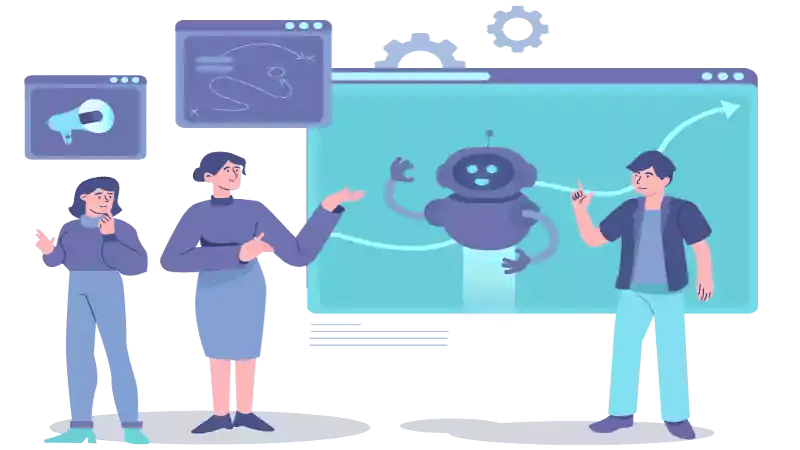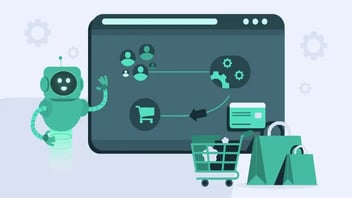Chatbot Statistics - Should I Implement an AI Chatbot?
Artificial intelligence (AI) chatbots are becoming increasingly popular to support and automate customer service tasks. But are they right for every business?
We will discuss the benefits and drawbacks of AI Chatbots, look at a bunch of numbers, and some options to explore.
Beta Version - (marked) parts of this content are in still development and will be updated on an regular basis.
 What is a chatbot?
What is a chatbot?
A chatbot is a computer program designed to mimic human conversation and interact with users. While not all chatbots possess artificial intelligence (AI), contemporary chatbots incorporate cutting-edge conversational AI techniques such as natural language processing (NLP) to comprehend user queries and provide automated responses.
We're currently operating the HubSpot AI Chatbot, the Breeze Customer Agent (beta). AI-leen It greets you in the language of the page it is on. But, ask it in any language, and it will respond in your language.
Why do Chatbots matter (the promised statistics)?
Chatbots matter to the visitor:
-
83% of consumers expressed their loyalty towards brands that provide chatbots for tasks such as scheduling appointments and addressing customer service inquiries [MarketSplash].
-
About 69% of consumers prefer utilizing conversational marketing chatbots due to the speed with which they can initiate contact with a company [Salesforce].
-
60% of B2B buyers only want to talk to sales once their own research has been completed [HubSpot].
-
52% of consumers are more likely to make repeat purchases if the company offers support via live chat [Kayako].
-
Approximately 47% of customers express willingness to complete a purchase exclusively through a conversational marketing bot [HubSpot].
-
40% of millennials say they interact with chatbots on a daily basis [Mobile Marketer].
-
Nine out of ten consumers would like the option to use messaging to contact a business [Twilio].
Chatbots matter to the business:
- 80% of routine questions can be answered via chatbots [IBM].
-
Around 79% of businesses report that implementing a conversational marketing bot has yielded favorable customer loyalty, sales, and revenue outcomes [MarketSplash]
-
CRM users reported a 74% improvement in customer engagement after implementing conversational marketing techniques [zipdo]
-
73% of B2B buyers say they want a personalized, B2C-like customer experience [Accenture].
-
Engaged Prospects 70% More Likely to Become Marketing-Qualified Leads [Oracle].
-
62% of customers expect companies to adapt based on their actions and behaviors [Salesforce].
-
Using conversational marketing, ThoughtSpot saw 10x more sales conversations, 70% more marketing-qualified leads, and 64% more meetings booked [Muan Technologies].
-
Conversational marketing can increase conversion rates by up to 45% [zipdo].
-
Implementation of conversational marketing bots can lower customer service expenses by approximately 30%. [Chatbots Magazine]
-
Zero Motorcycles gained 30% more leads in 30 days, thanks to Conversational Marketing bots [Qualified].
-
Less than 20% of B2B website visitors are legitimate prospects [Demandbase].
-
Conversational Marketing Boosts Sales Opportunities by 20%, Order Value by 10% [TS2 Space].
-
Chatbots have the potential to save up to 2.5 billion customer service hours globally in 2023 [zipdo].
-
The global chatbot market is expected to reach $1.25 billion by 2025 [zipdo].
-
eCommerce transactions via chatbots are expected to exceed $112 billion in 2024 [Juniper Research].
-
B2B companies, on average, take approximately 42 hours to provide a response to a lead after they've completed a form. [Nielsen Norman Group]
-
Initiating a follow-up with a lead within the first 5 minutes after the initial contact could potentially increase the probability of converting them by a factor of 9. [Nielsen Norman Group]
-
If a sales development rep can schedule a meeting with a lead the same day that a lead came in, the close rate is 3X higher than if they connected 48 hours later [Salesforce].
HubSpot announces early Chatspot.ai version in early 2023:
Benefits of AI Chatbots
AI chatbots offer several benefits, including:
-
24/7 availability: AI chatbots can answer customer questions 24 hours a day, 7 days a week. This can free your human customer service representatives to focus on more complex tasks.
-
Reduced costs: AI chatbots can help you reduce your customer service costs. This is because they can handle many customer inquiries without human intervention.
-
Improved customer satisfaction: AI chatbots can help you improve customer satisfaction by providing quick and accurate answers to their questions.
-
Personalized experiences: AI chatbots can be programmed to provide personalized experiences for each customer. This can help you build stronger relationships with your customers.
Drawbacks of AI Chatbots
AI chatbots also have some drawbacks, including:
-
Limited capabilities: AI chatbots are still under development and have limited capabilities. They may not be able to handle complex or nuanced questions.
-
Can be frustrating: If an AI chatbot does not understand a customer's question or provides an incorrect answer, it can be frustrating for the customer.
-
Can be impersonal: AI chatbots can lack the human touch that some customers prefer.
AI chatbots can be a valuable tool for some businesses but are unsuitable for others. When considering implementing an AI chatbot, carefully weighing the benefits and drawbacks is essential.
Providers of AI-supported Chatbots
Chatbots have evolved from simple text-based interfaces to sophisticated conversational UIs that handle complex queries and provide personalized experiences. They are used for various purposes beyond customer service and continue to become more personalized and engaging.
With the potential to revolutionize our interaction with businesses and technology, chatbots are still under development and hold promise for the future. Here are some market players we have on our radar screen:
HubSpot
Section in development: this will be updated regularly
HubSpot has released its AI ChatSpot at Inbound 23; it is part of a broader rollout of HubSpot AI. Chatspot focuses on the portal user population.
For use with website visitors, prospects, and customers, the AI chatbot is currently in private beta and is part of the HubSpot Service Hub, take it for a spin with the updated version on the bottom left.
Intercom Fin
Intercom, a global leader in messaging, has launched Fin, its new AI chatbot powered by OpenAI's GPT-4. Fin can converse naturally with customers to answer their questions about products or services, troubleshoot problems, and provide support. It can also automate tasks such as scheduling appointments or taking orders.
-
Fin is powered by OpenAI's GPT-4, a large language model that can generate text, translate languages, write different kinds of creative content, and answer your questions in an informative way.
-
Fin can converse naturally with customers, even if they ask open-ended or challenging questions.
-
Fin can be used to answer questions about products or services, troubleshoot problems, and provide support.
-
Fin can also automate tasks such as scheduling appointments or taking orders.
-
Fin is still under development, but it has the potential to revolutionize the way businesses interact with customers.
Salesforce Einstein
Salesforce Einstein chatbots are potent tools that improve customer service, automate tasks, and save money for Salesforce.com users. They understand natural language, use machine learning, and can automate processes like scheduling appointments. Integrated with Salesforce CRM, they provide personalized responses and support customers across multiple channels. With scalability, they are suitable for businesses with a large customer base. Applications include customer service, sales, marketing, and internal chatbots.
Should I implement an AI Chatbot?
Yes. If you are interacting with prospects and customers, this isn't a question of if but of when. Here are some things to consider when deciding on implementing an AI chatbot for your website:
-
The type of business you are running. AI chatbots are most effective for businesses that receive a high volume of customer inquiries.
-
Your target audience. If your target audience is tech-savvy, they may be more accepting of an AI chatbot.
-
Your budget. The cost of implementing and maintaining an AI chatbot can vary depending on your chosen platform and the features you need.
-
Your willingness to invest in training and maintenance. AI chatbots require regular training and maintenance to ensure they are up-to-date and functioning correctly.
Implementing the HubSpot AI Chatbot
HubSpot has released its AI ChatSpot at Inbound 23. It is currently in private beta and is an exciting additional development to leverage the HubSpot Service Hub Pro or HubSpot Service Hub Enterprise. Contact our team of accredited HubSpot consultants if you want access to the beta version as an existing customer, are looking to subscribe to HubSpot Service Hub, or require assistance in leveraging AI in your business.
This content is also available in:
- German: Chatbot-Statistiken - Sollte ich einen KI-Chatbot einsetzen?
- Spanish: Estadísticas Chatbot - ¿Debería implementar un Chatbot AI?
- French: Statistiques sur les chatbots - Dois-je mettre en place un chatbot IA?
- Italian: Statistiche sui chatbot - Dovrei implementare un chatbot AI?
- Romanian: Statistici Chatbot - Implementarea unui AI Chatbot
- Chinese: 聊天机器人统计--我是否应该实施人工智能聊天机器人?

Joachim is a certified HubSpot trainer with over 13 years of experience in content marketing, strategy, website development, and SEO. He has implemented numerous large-scale, international growth marketing programs, including one with UiPath, which grew from a startup to a successful IPO on the NYSE. Joachim has special expertise in multilingual marketing and sales enablement projects, and he uses the latest AI technologies to help our clients.







Leave a Comment